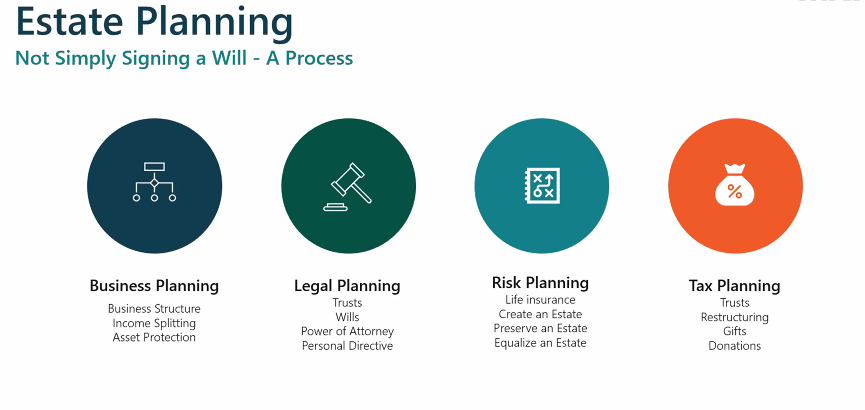Estate Planning: What You Should Know
What is Estate Planning? About Estate Planning and Preparations.
Estate planning encompasses a wide variety of elements, including legal documents and preparations for your family. An estate plan can include everything from a Power of Attorney for your health care and financial affairs if become incapacitated, to a Will after you’re passing. It spans the naming of an executor to carry out your wishes, appointing a guardian for minor children, and more.
Death Comes For Us All, But Are You Prepared?
Need Estate Planning? Here’s What to Consider

Estate planning includes retirement and the preparation of a Will.
The overall planning of a person’s present wealth and it’s growth is estate planning. All of the assets owned or controlled by a decedent and the debts that were the responsibility of the decedent at the time of the deceased’s death including taxes due at death are included in Will planning. Estate planning includes retirement planning and the preparation of a Will and the planning for taxes after the individual’s death. To meet a person’s goals concerning preparing for incapacity and death, numerous factors such as financial, estate taxes, insurance, investment, and tax implications must be taken into consideration.
The main legal documents are a Power of Attorney and a Will. A Power of Attorney document is also known as a Living Will. It outlines provisions for the management of your finances and medical care if you become incapacitated through injury or illness. And it protects your assets while you are still alive. A Will comes into effect when you pass away. It provides instructions on how your assets will be managed and distributed after you’re gone, such as payments to named beneficiaries.
Creating an estate plan provides peace of mind knowing that the assets you have accumulated in life will be distributed the way you want.
And it can simplify settling your estate and minimize taxation and administration costs. Proper estate planning can greatly reduce the burden on those left behind. Most importantly, it can avoid uncertainty about how to settle your estate.
Estate planning checklist
Creating an estate plan may seem daunting. So how do you get started with estate planning in Canada?
First, it’s important to think through your goals and wishes. Whom do you want to provide for after your death? What assets do you have and how would you want those divided or allocated? If you have a primary beneficiary, who would be the next choice if something were also to happen to that beneficiary? Who would you want to become a guardian for your children if they are minors? And has that person consented to be the guardian? And who would make decisions on your behalf if you were still alive, but unable to speak for yourself due to illness or injury? Making these basic decisions before starting the process can save you time and money
Many people think writing your Will is a daunting, overwhelming process. It’s a simple legal document that outlines a few key roles. While you don’t need to list your net worth or include detailed inventories, the more information you compile for your executor, the easier their job.
The important paperwork:
- Make a list of your key assets (assets like your house and investments) – note that your will covers your umbrella estate (everything you own). So, it’s not necessary to list everything in detail. Rather this list of assets will help inform whether you want to leave certain items or accounts to specific people.
- Make a list of your liabilities (like a mortgage or loans) so your executor will know what debts need to be paid from your estate.
- Ensure that you have named beneficiaries for investments such as RRSPs and LIFs – you can work directly with your financial institution or advisor to add/update any named beneficiaries. If there is a named beneficiary on a policy/account, it will go directly to that person rather than being covered by your will. This can help to reduce taxes, and it means payments are made to beneficiaries much faster.
- Record life insurance policy information (personal and employer group policies)
- Include policy numbers, the company issuing the policy amounts payable and named beneficiaries on the policies.
- Make note of any disability income insurance available for your care if needed.
The key people:
- Choose the person or persons you want as your Power of Attorney for health care. They will act on your behalf if you are incapacitated. Make sure you speak with them so they’re aware of the appointment. And consider whom you would add as a backup in case they’re unable to perform in the role.
- Select the executor for your will – just like your Power of Attorney, ensure you speak with them first and choose backups. Being an executor is a big job and it’s important to ensure the person you choose is up for the task.
- Decide your beneficiaries to receive a percentage of your residual estate (everything that’s left after debts/taxes are paid and any specific gifts are distributed).
- If you have dependent children, choose a guardian for their care and management of their inheritance.
- Provide for family members with special needs to ensure government benefits will continue
Special considerations:
- If you have pets, decide on care of them after your passing (and leave a lump sum to your chosen pet guardians for their care if you choose).
- Create a list of any important items you want to give to specific recipients. For example, you can leave a lump sum to charity, give a piece of jewellery to a family member, or gift a car or property.
- Consider any particular issues that might pertain to your estate like trust funds, separation agreements, etc.
- Review whether any assets are jointly owned. Review the ownership structure to understand how those assets will or will not pass through your estate.
- If you are a business owner, provide for the transfer of the business in case of disability or death.
- Also think about the removal of all your passwords, emails and digital paths.
What are the four important estate planning factors?
#1 is the complexity of your estate. The scope of the estate will often determine how simple or complicated the estate plan will be. Are you a multi-millionaire or have you had multiple marriages and children with more than one partner? If so, your estate planning will likely be complex. Other elements that can add complexity are foreign assets, businesses, and setting up complex trusts. The more complex, the more important it is to have a well-defined plan for how your assets are managed.
#2 is your stage in life. Do you have young children who are dependent on you? Do you have elderly parents relying on your support? In those instances, your dependents will be a primary consideration in your planning. If you are a senior with no children, you may want to consider leaving a charitable legacy rather than naming beneficiaries.
#3 is personal goals. Are you creating an estate plan to provide for surviving children or other relatives? Do you want to ensure a partner’s standard of living is sustainable after your passing? It’s important to consider what is important to you as you create your estate plan.
#4 is who you trust. This includes choosing a trusted person or persons to act on your behalf should you become incapacitated while still alive. And it includes having a reliable executor to carry out your instructions after death.
Keeping your estate plan updated
Regardless of how an estate plan is created – by an individual or with professional guidance – it’s important to revisit the plan every few years. That will ensure your estate plan keeps pace with changing circumstances at each stage in life.
Things that can change your planning landscape include starting a family, buying a home, separating or divorcing, marrying, experiencing illness, or other major life events. Many people don’t know that in some provinces, divorce doesn’t invalidate a gift made to an ex-spouse in a will. In many provinces including Ontario, marriage invalidates a will unless the will explicitly includes a ‘contemplation of marriage clause. As with the pandemic, key inflexion points in life – whether positive or negative – should serve as catalysts to review, update, or create an estate plan. Note now in Ontario a divorce does not invalid a Will is your Will current.
Estate planning services and what you can do to protect yourself and your loved ones
The overall planning of a person’s wealth is estate planning. All the assets owned or controlled by a decedent and the debts that were the responsibility of the decedent at the time of the deceased’s death are included in estate planning. Estate planning includes the preparation of a will and the planning for taxes after the individual’s death. To meet a person’s goals concerning preparing for incapacity and death, numerous factors such as financial, estate law, insurance, investment, and tax implications must be taken into consideration.
Why did I need to do it?
The pandemic has highlighted the need to plan. You never know when life is going to throw you a curveball, and you need to ensure you have a plan in place that contemplates both death and disability.
Another example that applies to similar matters other than Covid is if you are in a Car without Power of Attorney your spouse has to apply to the court to act on your behalf to manage his finances. I don’t want any of my other clients or their families to have to go through that. A recent occurrence of this happening was the Hockey players in Saskatchewan who were over 18th birthdate the parent had to apply for permission to deal with their health issues.
Even someone who’s 30 will probably have multiple bank accounts, a retirement account, debts, and personal property that needs to go somewhere should they die. It’s frightening to think about your death, but life is unpredictable and it’s a lot easier for your loved ones if you create a plan before you die.
What are the benefits of doing Estate Planning?
If you plan and follow it with frequent reviews to be you stay on the plan, so you achieve your goal.
You make a Will to execute your plan when you die. A will is a legal document that says how you want your estate to be divided once you die. Your estate includes what you own (called assets) and what you owe (called liabilities). An up-to-date will that is reviewed frequently can help your executor deal with your estate when you die. Provinces and territories set the laws for estates. if you don’t have a will, the laws in your province or territory will determine how your estate is divided.

4 Legal Steps to Estate Planning. How do I start estate planning?
1. Consultation
During the initial consultation, we will examine your prior estate plans, if any, such as wills, codicils, trusts, healthcare directives, and power of attorney. We will discuss any changes to your assets and heirs, and then educate you on your choices for eliminating or reducing estate taxes and making probate easy.
2. Conference
We may set up a conference to respond to any other questions you may have with your estate plan. We will send you the draft estate plan for your review and, if needed, a revision of these documents.
3. Completion
Upon approval, we will schedule a final meeting to execute and notarize your documents.
4. Annual Review
Keep your will up to date. Review it often. Make sure it reflects your current wishes and the state of your finances. Be aware that in some provinces and territories, getting married, living common-law or getting divorced or separated can cancel any previous wills you had made.

Contact Glenn Stewart, CIP, CRM, CHS, CEA
1-888-256-8685
or email to glenn@glennstewartinsurance.com
Learn More About Insurance
Tip
If you die without a will, your assets and belongings will be distributed based on provincial legislation. This may impact important relationships in your life that are not recognized by these laws.
